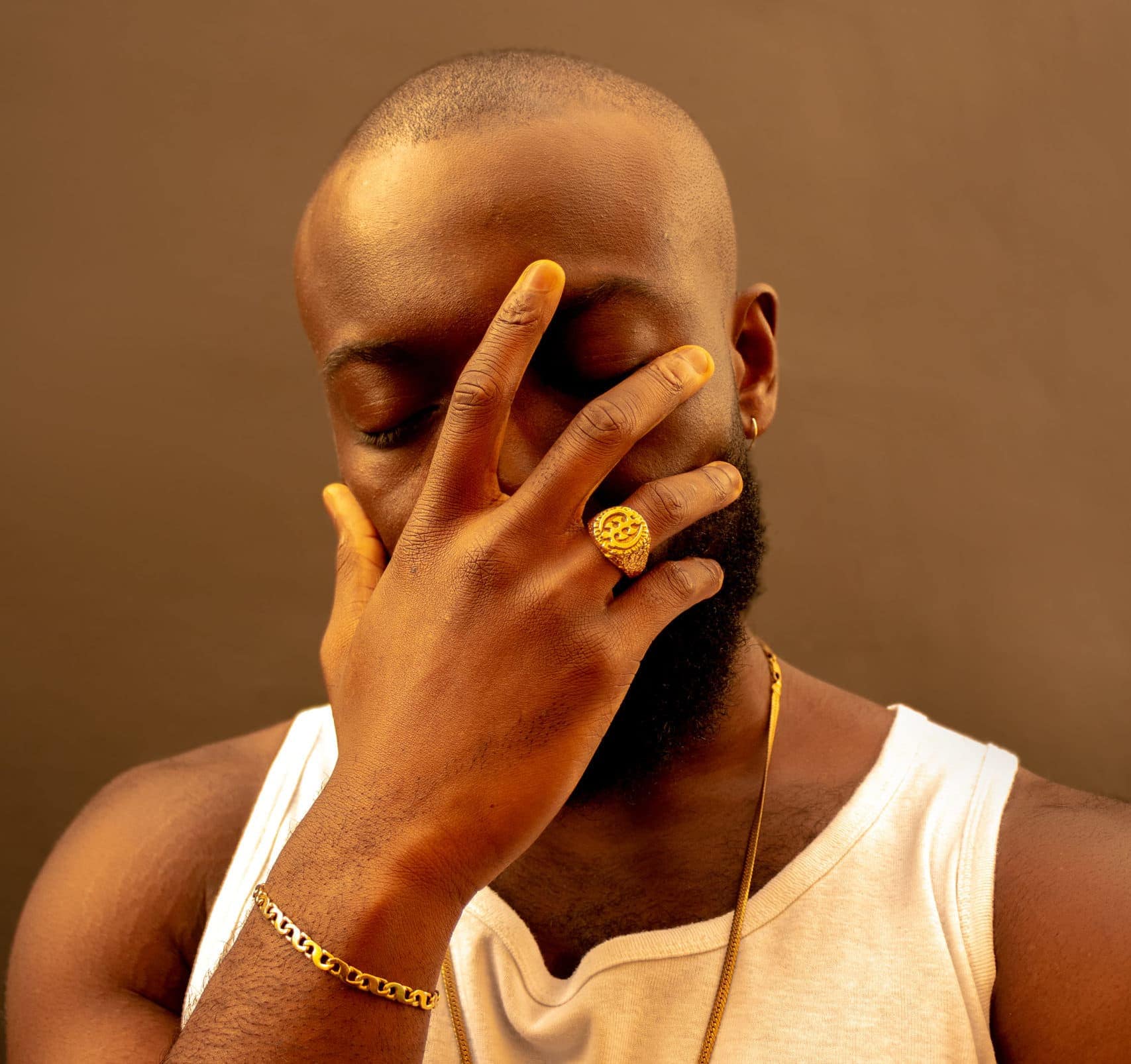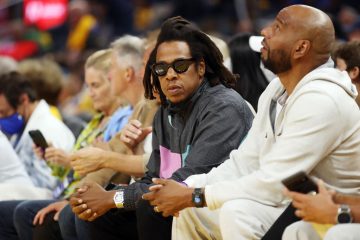

Comparing the process to writing an essay, of which he wrote many while studying Human Geography at the University of Liverpool, Asante recalls, “you have a marking criteria, so it’s emotion, referencing people, and getting your point across.” He is especially keen to communicate his roots, given that some think his deep, honey-coated voice is American: “I make a point to write about set places in London, my culture, and being a Black boy.”
At 25-years-old, Kwaku Asante has only been taking music seriously for 18 months. Even in this instantaneous era, it’s a short time to amass a dedicated fanbase, release an EP alongside several singles, and sell out headline shows.
‘If D’Angelo and Frank Ocean had a baby, I want to be the love child.’ Although meant as an aspirational statement, Asante’s voice is far more than the combination of others
However, music is part of his lineage, with his mum a musician, and his grandfather an executive producer in Ghana who worked with legends, such as Fela Kuti and Miriam Makeba. Asante played piano until Grade 4 “when it got boring”, but this was layered with an informal musical education at church, which was “quite gospel-y, quite jazzy, so I’d be hearing drums, keys, guitar and mad bass,” as well as music at home from the likes of Whitney Houston and Luther Vandross.
But Kwaku’s biggest artistic influence is D’Angelo, who he describes as “the greatest of all time.” Not unusual then that Asante’s own sound has tinges of the RnB legend: “If D’Angelo and Frank Ocean had a baby, I want to be the love child.” Although meant as an aspirational statement, Asante’s voice is far more than the combination of others. His tone is authoritative, but with a depth of sensuality, which shifts the resonance from gospel and jazz undertones, to a distinctly soulful experience.

“The first time I ever recorded anything was at the beginning of 2017. Then I put out a snippet every month.” Using SoundCloud to test the waters, Asante built a cult following while he was “getting better”, by “thinking of lyrics, thinking of concepts, doing YouTube tutorials on how to improve your falsetto, your baritone.” With mini milestones validating his work, such as a Rinse FM interview, this period culminated in releasing ‘The Way That You Move’ in July 2018.
His first EP, honeycomb, dropped in December 2019, and sounds as delicious and complex as the title suggests. However, it only took one week to put together the entire project. Not surprisingly, Asante was ill at the end of it, after working 13-hour days, plus two hours of daily travel. It’s clear that Asante doesn’t do anything in half measures: “The process was intense, it was quick, it was very emotive, talking to Dan about what I was going through, we had a lot of in-depth conversations.” Equally, he knows his limits when ‘finishing’ a track: “I just get to a point when I’m happy with it. I just say, ‘Kwaku, put it down’. If I waited for a song to actually be finished, nothing would get released.”
I just get to a point when I’m happy with it. I just say, ‘Kwaku, put it down’. If I waited for a song to actually be finished, nothing would get released.
The stand out track from honeycomb is ‘Molasses’. With a name that evokes many plausible meanings, the song doesn’t disappoint in its significance. Asking Asante why he chose this vivid word, he settles on its sticky quality, “Molasses is obviously sweet, and it’s purpose isn’t to hold stuff together, but it’s so sticky that it could.” With lyrics like, “Making me wonder why, project a lower type / Moving us forward together, the glue that keeps me sane,” Asante recalls a previous relationship, “It’s an ode to a person who’s adding to my life and also holding it together, by saying sweet things, doing sweet things like supporting me, and intimacy – when it’s you and her, it’s no one else.”
Inspired by his dissertation, “The Representation of Gender and Sexuality in Black Popular Music’, Asante uses ‘Sunday’ to illuminate part of the slave trade, where “Sunday was the only day that mothers were allowed to braid their daughter’s hair,” represented in the first line, “Braiding your hair, secrets we shared.” Impacted by a past relationship with a Black woman who educated Asante on socio-cultural challenges of wearing her hair naturally, he wanted to show that “there is beauty in every shape, size and colour.” Asante continues to explain, “It’s a take on love and social commentary. There are things in the world’s history that still hold weight today.”

Recently releasing a live video of ‘Sunday’ for International Women’s Day, interlaced with images of Black women, Asante “just wanted to say, ‘Thank you, I think you’re amazing’.” Developed with Creative Director Curtis Essel of 33BOUND, the video is dedicated to these women, and the common ground shared as a “Black boy in London.”
Asante is a natural writer, but performing live is what keeps him going. Not just because he sings with his band, the members of which he praises unendingly, but also for the crowd reaction. For someone mainly singing love songs, he’s all about the ‘little moments’, “When I sing ‘Fantasy’ and they’re looking at each other, I’m like, ‘Yeah, you’re in love and you’re here!’ I hope in the future people propose.”
When I sing ‘Fantasy’ and they’re looking at each other, I’m like, ‘Yeah, you’re in love and you’re here!’ I hope in the future people propose
Having headlined a packed-out Omeara last October, Asante has three sold out nights at Servant Jazz Quarters rescheduled for September. Using these shows to change production on a few tracks, Asante is confident in the atmosphere he wants to create. “It’s the best place to experience what I’m doing. I want you to be sweaty, dancing, bouncing, crying. I’m right next to the people, and hopefully if things keep escalating how they are, you won’t be able to do that again.” He craves intimacy not only between his fans, but between himself and the audience, hoping “to actually connect and chat.”
For Asante, he’s just happy “having people gravitate and fully accept you, support you, and push you when your artform is sincere and pure. Success for me,” he adds, “is being able to put people in a position to succeed when they have supported you from the jump,” among these being his manager and producer. Asante takes great comfort in artists that he admires enjoying his music, and more collaboration is next on the agenda.

In the meantime he is, “Trying to make the most out of this weird, weird time and being prepared for when all the dust settles so I can pick up where I left off, because I was gaining momentum.” This much is true, but with IG Live allowing Asante to do gigs from his bedroom, and recording equipment at arm’s reach, there’s plenty to look forward to.
With a statement that couldn’t be more fitting today, Asante encapsulates his ultimate goal, “I want my music to stand the test of time, but these things take time.” Luckily, this is available in abundance. Asante’s voice and approach to music is too special not to nurture, and his perception of love and heritage are needed now more than ever.




